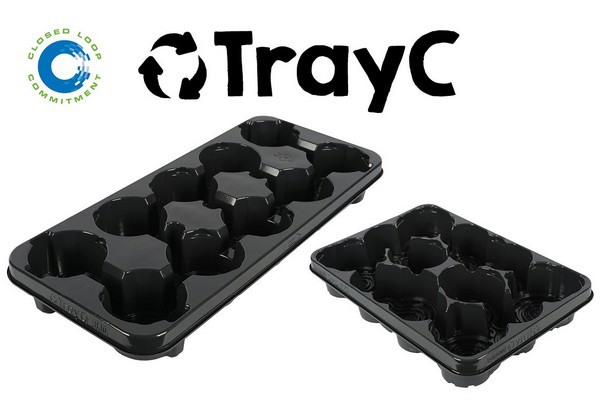Plastic has gotten a negative name in recent years. This isn’t necessary, however, as long as the chain is closed, says Lisa van Koningsveld with Modiform. "In terms of sustainability, you can take steps as a company, but to really make a difference, collaboration is essential." For this reason, they started the TrayC system at Landgard last year, where the goal is to keep transport trays within a circular system. "It prevents downcycling, reduces the use of plastic, and also addresses the problem with non-recycled transport trays." The range has already expanded from 5 to 11 models in different sizes and the interest from growers and retailers is increasing.

Sustainability
There is an increasing focus on sustainability, also in the horticultural sector and therefore also in the tray world. "6 to 7 years ago you could see that a tray consisted of 60% recycled plastic and 40% 'virgin' plastic, whilst now would be 98 to 100% recycled plastic. In the whole chain, from grower to consumer, you see more and more awareness. People want to become more sustainable and the transport tray also plays a role in this."
Raw material shortage
In addition, especially now, with the shortage of raw materials, it is essential that products are retrieved so that new ones can be made from them. "It is important that all of us, not just us, make the utmost effort in recycling the trays."
Collaboration
To achieve this, collaboration is key. Modiform has even formulated an ambition with Horizon2025 to work together with the entire chain to change the industry sustainably. "This is the only way we can really make a difference." The collaboration between Modiform and Landgard is an important step toward chain-wide collaboration. And Modiform goes further than just promoting the benefits of the TrayC system or its own products. "Plastic has gotten a bad reputation recently, and so we want to make sure that there is more awareness on recycling, not only of our trays, but of all trays. For example, it is very important that retailers are put on notice not to give transport trays to consumers because they cannot be recycled through consumer waste."
Cooperation is also important in the area of reducing the ecological footprint, Lisa emphasizes. "Nowadays many companies want to make their footprint transparent, including us. However, it is important to know what the total footprint is throughout the whole chain. That's why we want to share our footprint and be transparent about it as well."
Sharing success
Sharing success is another form of collaboration, Lisa explains. "Last year we started the TrayC system with Landgard. First, we started with 1 German DIY store chain and now we see demand coming from multiple angles." After this successful year, other manufacturers may/can also produce the trays. "Again, only together can we make a difference."
TrayC , how does it actually work?
But how exactly does the TrayC work? Lisa: "The strongest benefit this system displays, is its standardization, each tray is made of 100% recycled polystyrene (PS). So no new plastic is used. In addition, the recycling percentage is increased because only one type of material is used, namely PS. The grower buys the tray, and via Landgard and the retailer, it will return to a central point at Landgard where the usable trays are used again. The non-usable trays are recycled by Modiform in order to create new trays. Because the trays are uniform and very stackable, the collection and sorting is very low-threshold."
For more information: Modiform
Modiform
Ambachtsweg 15
3831 KA Leusden
+31 (0)33 434 31 66
[email protected]
www.modiform.com
